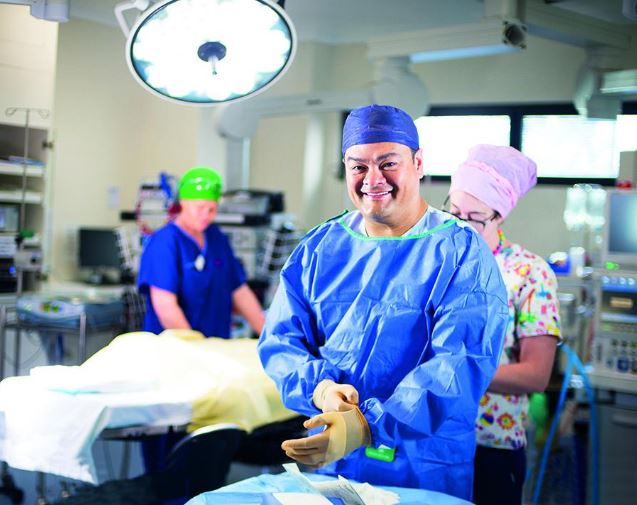Now an ear, nose and throat surgeon, Associate Professor Kelvin Kong was destined for health care. Growing up Kelvin and his sisters were always keen to help his mother, a Registered Nurse, whenever she had a one of their mob come around to remove a suture, tend to a cut or get a vaccination.

But it wasn’t until early high school when a visit to a University to meet two Aboriginal medical students changed Kelvin’s path into medicine.
‘Sandra Eades and Louis Peachey—these were two amazing, smart, articulate, Aboriginal students at university studying medicine. To this day, I can still remember talking with my sisters about how going to university and studying medicine was even possible for us,’ Kelvin said.
‘University was not even on the map, not even a thought and having two strong people tell us ‘you guys can do this, you don’t need to think about leaving school, you need to concentrate about getting what you want, getting the scores and the goals,’ it was so powerful.
'That one day from high school has changed my life trajectory forever and I’m indebted to Sandra and Louis for what they did for me.'
As Kelvin became older he started to reflect on the overwhelming reliance his community—Worimi, north of Newcastle—had on his mother, rather than the local doctor or hospital.
‘You start thinking that there’s obviously gaps there—why are we not being seen and not able to get the access that our non-Indigenous friends are getting? I think this spurred my interest in health and the disparity in health and health care,’ Kelvin explained.
Once in medicine, Kelvin was shocked to find some of the disparities between Indigenous and non-Indigenous health in Australia, particularly in ear health.
‘It was also frustrating to see these disparities not being met with evidence-based and culturally appropriate research,’ Kelvin said.
‘However, seeing Peter Carter—an ENT surgeon—really engaging with community inspired me down this path.’
A genuine, humble and optimistic soul, Kelvin became Australia’s first Australian Indigenous surgeon. Kelvin continues to dedicate his career to early intervention.
‘For instance, if we can reduce the risk of hearing loss, we can have a direct impact on a child’s ability to learn and develop. The change that we see is remarkable—we can take them from limited hearing and language skills to fully functioning teenagers with real employment prospects,’ Kelvin said.
Kelvin is now also part of a remarkable evolution of surgery and multidisciplinary research synergy.
The EXIT (ex utero intrapartum treatment) procedure is an extraordinary life-saving operation that uses multiple different avenues of research to be able to understand and perform this kind of revolutionary surgery.
‘We now have the ability to deliver a baby’s head through caesarean section without inducing labour,’ Kelvin explained.
‘EXIT surgery is all from research—foetal development, maternofoetal circulation, imaging advances, anaesthetics, and timing, which can help us deliver a baby suffering from a blocked airway in a safe manner, for example.’
‘To be able to work in today’s environment—the medical care that is afforded to us is just incredible,’ Kelvin added.
‘The surgery is meticulously planned and very tightly controlled. There is an anaesthetics team looking after mum and one looking after baby, a neonatal intensive care team, two ENT teams—one doing the surgery, and another ready in case of an emergency tracheostomy *, and the important obstetric team,’ he explained.
Working with academics, scientists and clinicians who share that same passion in deriving the correct answer in a manner which can be translated back to the community is one way Kelvin ‘gives back.’
Kelvin is also a member of the Principal Committee Indigenous Caucus (PCIC), which is an advisory committee for NHMRC, as well as NHMRC’s Health Innovation Advisory Committee.
‘There is always that feeling of wanting to contribute and give back. I’m extremely lucky and very humbled by the opportunities that I’ve been given every day,’ Kelvin said.
'I wake up every day thinking—how have I got this amazing life? It’s because of the opportunities that were afforded to me.'
For Kelvin, it doesn’t matter whether it is an EXIT procedure or a Cochlear implant; it’s about having a passion for what you’re doing.
‘You need to find that niche that you enjoy first of all. If you find that then you’ll find that passion. It’s the same for research. There are so many different avenues and some of the research is just amazing,’ Kelvin said.
‘Although Sandra and Louis’ journey is very different to mine, the things that we say, particularly to kids from low socioeconomic groups can have a very profound impact. You need to make sure you can make a positive impact and influence these kids into the right trajectories.’
* surgical opening of the throat to allow direct access to the airway for breathing